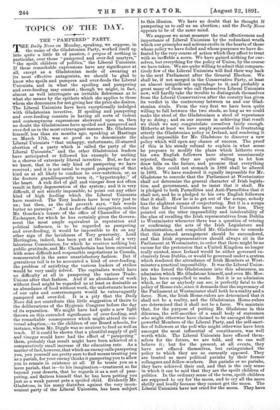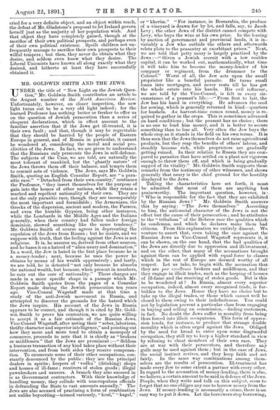TOPICS OF THE DAY.
THE " PAMPERED" PARTY. THE Daily News on Monday, speaking, we suppose, in the name of the Gladstonian Party, worked itself up into quite a little fit of passion, a propos of nothing in particular, over those " pampered and over-fed martyrs," " the spoilt children of politics," the Liberal Unionists. If these remarkable expressions have any significance at all, except as a Gladstonian mode of swearing at its most effective antagonists, we should be glad to know who spoils and pampers and over-feeds the Liberal Unionists, and in what the spoiling and pampering and over-feeding may consist ; though we might, in fact, almost as well interrogate an irritable fishwoman as to what she means by the epithets which she applies to those whom she denounces for not giving her the price she desires. The Liberal Unionists have been exceptionally indulged with Gladstonian invective. If spoiling and pampering and over-feeding consists in having all sorts of violent and contemptuous expressions showered upon us, then no doubt the Gladstonians have spoiled and pampered and over-fed us in the most extravagant manner. Mr. Gladstone himself, less than six months ago, speaking at Hastings on March 17th, was so good as to denominate the Liberal Unionists " that unhappy, unfortunate, ill-starred abortion of a party which is called the party of the Liberal Unionists," and the other Gladstonian leaders have anticipated or followed his example by uniting in a chorus of extremely liberal invective. But, so far as we know, that is the only kind of pampering we have received ; and it is not usual to regard pampering of that kind as at all likely to conduce to over-nutrition, or, as the doctors grandiloquently term it, " hypertrophy," of the heart. A rich diet of gall and vinegar does not often result in fatty degeneration of the system ; and it is very difficult, if not strictly impossible, to point out any other kind of high feeding which the Liberal Unionists have received. The Tory leaders have been very just to us ; but then, as the old proverb says, " fair words butter no parsnips." And as for official recognition, unless Mr. Goschen's tenure of the office of Chancellor of the Exchequer, for which he has certainly given the Govern- ment the most ample equivalent in reputation and political influence, is to be regarded as pampering and over-feeding, it would be impossible to fix on any other sign of the lavishness of Tory generosity. Lord Hertington, indeed, has been put at the head of a very laborious Commission, for which he receives nothing but public gratitude, and Mr. Chamberlain has been entrusted with some difficult and responsible negotiations in Canada, remunerated in the same unsatisfactory fashion. But if gratuitous toil is to be accounted a kind of over-feeding, the problem of satisfying the various leaders of strikes would be very easily solved. The capitalists would have no difficulty at all in pampering the various Trade- Unions after that fashion. And if an abundance of work without food might be regarded as at least as desirable as an abundance of food without work, the unfortunate horses of our cabs and costermongers would be extravagantly pampered and over-fed. It is a pity that the Daily News did not contribute this little suggestion of theirs to the deliberations of the Hygienic Congress before the day of its separation. We might have had quite a new light thrown on this extended significance of over-feeding, and the remarkable consequences which might attend its uni- versal adoption,—to the children of our Board schools, for instance, whom Mr. Diggle was so anxious to feed as well as teach. If it could be shown that a plentiful supply of gall and vinegar would have had the effect of " pampering" them, probably that result might have been achieved at a comparatively small increase of the education rate. As a matter of fact, however, that which an enemy calls pampering you, you yourself are pretty sure to find means treating you as a pariah, for your enemy thinks it pampering you to allow you to remain in existence at all. If he treats you as a mere pariah, that is—to his imagination—treatment so far beyond your deserts, that he regards it as a sort of pam- pering, and flatters himself that he has been petting you just as a weak parent pets a spoiled child. Evidently Mr. Gladstone, in his many diatribes against the very incon- venient party of the Liberal Unionists, has been subject to this illusion. We have no doubt that he thought it pampering us to call us an abortion ; and the Daily News appears to be of the same mind.
We suppose we must measure the real effectiveness and importance of Liberal Unionism by the redundant wrath which our principles and actions excite in the hearts of those- whose policy we have foiled and whose purposes we have de- feated by the very course of action which they affect to treat with so ineffable a scorn. We have gained nothing for our- selves, but everything for the policy of Union, by the course. we have taken. We are quite willing to admit that compara- tively few of the Liberal Unionists will find their way back to the next Parliament after the General Election. We- shall be, if not merged in the Conservative Party, at least an almost insignificant appendage to it, and probably a great many of those who call themselves Liberal Unionists now, will hardly take the trouble to distinguish themselves from the Liberal Conservatives after the country has given its verdict in the controversy between us and our Glad- stonian rivals. From the very first we have been quite willing to fall between the two stools, so long as we could make the stool of the Gladstonians a stool of repentance by so doing ; and on our success in achieving that result we think we may congratulate ourselves fairly enough. Hitherto at least we have amply succeeded in frustrating utterly the Gladstonian policy in Ireland, and rendering it• almost impossible for Mr. Gladstone to discover a new policy which will open any chance of success. The proof of this is his steady refusal to explain in what sense he proposes to modify the plans which hitherto even his own English followers have almost unanimously rejected, though they are quite willing to let him draw bills on the future, and promise that everything which they could not stomach in 1886 shall be altered in 1892. We have rendered it equally impossible for Mr.. Gladstone to concede that the Parliament at Westminster shall not determine the general character of Irish legisla- tion and government, and to insist that it shall. He is pledged to both Parnellites and Anti-Parnellites that it shall not, and he is pledged to his own English followers that it shall. How he is to get out of the scrape, nobody has the slightest means of conjecturing. But it is a scrape that the Liberal Unionists have made for him. They pointed out the utter impossibility and intolerability of the plan of recalling the Irish representatives from Dublin to Westminster whenever there was a question of vetoing or confirming the acts of the Irish Legislature and Administration, and compelled Mr. Gladstone to concede that this absurd arrangement should be surrendered, and that Irish representatives should always sit in the Parliament at Westminster, in order that there might be no excuse for the pretension that a United Kingdom no longer really existed, since Ireland would be either governed ex- clusively from Dublin, or would be governed under a system which rendered the attendance of Irish Members at West- minster a practical impossibility. It was the Liberal Union- ists who forced the Gladstonians into this admission, an admission which Mr. Gladstone himself, and even Mr. Mor- ley, has been compelled to make. But it is an admission which, so far as anybody can see, is perfectly fatal to the policy of Home-rule, since it demands that the supremacy of the Parliament at Westminster shall both be a reality and a farce. Now, the Irish Home-rulers are determined that it shall not be a reality, and the Gladstonian Home-rulers are determined that it shall not be a farce. We maintain that, for the purpose of putting Mr. Gladstone in this dilemma, the self-sacrifice of a small body of statesmen who might otherwise have claimed to be amongst the most powerful Members of the Liberal Party, and the self-sacri- fice of followers at the poll who might otherwise have been amongst the most influential of constituents, was well worth while. The Liberal Unionists have effaced them- selves for the future, we are told, and we can well believe it ; but for the present, at all events, they have not effaced themselves, but extinguished the policy to which they are so earnestly opposed. They are treated as mere political pariahs by their former colleagues and fellow-workers. But pariahs or no pariahs, they have achieved their end, and that is the only sense in which it can be said that they are the spoilt children of politics. In the ordinary sense of the term, spoilt children are supposed to cry for the moon, and to cry all the more shrilly and loudly because they cannot get the moon. The Liberal Unionists have not cried for the moon. They have cried for a very definite object, and an object within reach, the defeat of Mr. Gladstone's proposal to let Ireland govern herself just as the majority of her population wish. And that object they have completely gained, though at the sacrifice of their own political prospects, and perhaps even of their own political existence. Spoilt children not un- frequently manage to sacrifice their own prospects to their wilful tempers ; but then, they never do obtain what they desire, and seldom even know what they desire. The Liberal Unionists have known all along exactly what they desired, and hitherto at least they have successfully obtained it.



































 Previous page
Previous page